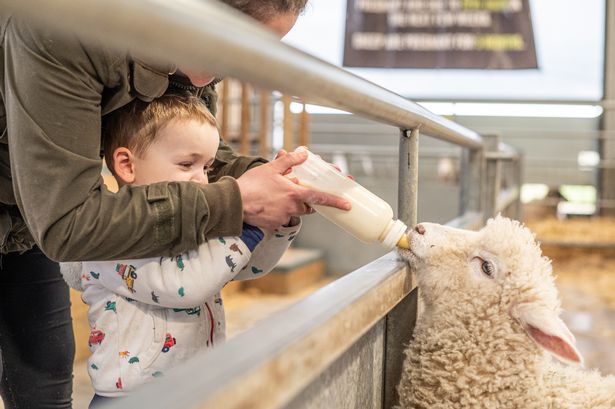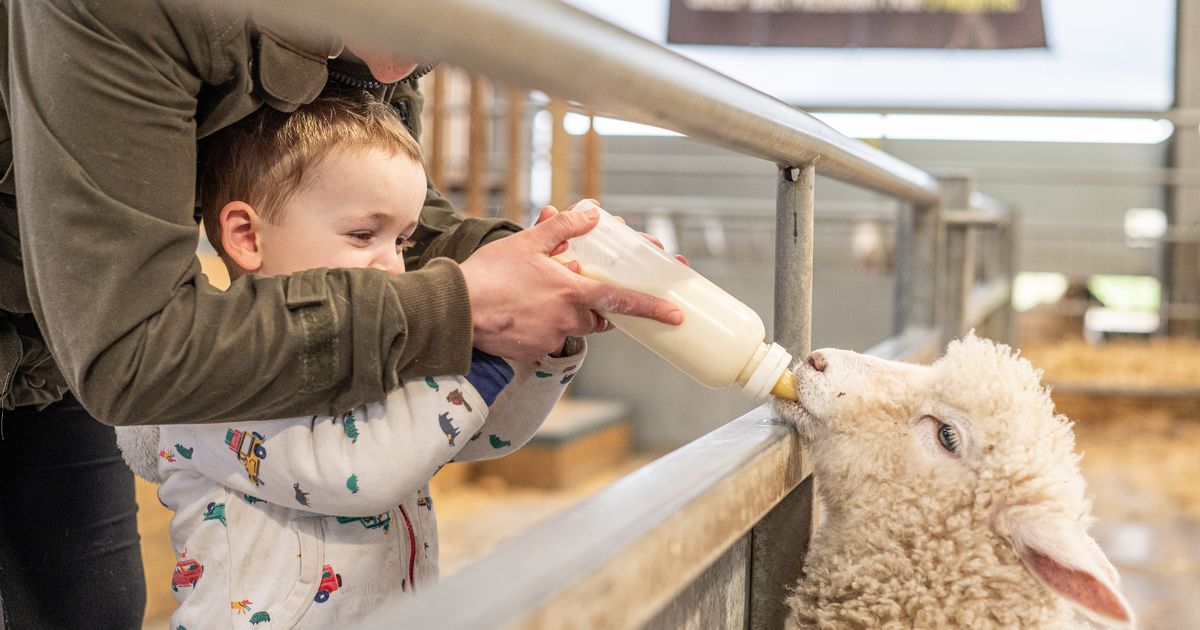The call is in a Public Health Report into a large cryptosporidium outbreak which affected 200 people A child bottle feeds a lamb(Image: Cotswold Farm Park)
A child bottle feeds a lamb(Image: Cotswold Farm Park)
A Public Health Wales (PHW) report into an infection outbreak linked to lamb-feeding sessions at a Welsh farm found there wasn’t adequate hygiene facitlites which likely contributed to people becoming unwell.
The probe into a large cryptosporidium outbreak which left over 200 ill in spring, 2024, found the farm linked to the infections had “rudimentary” handwashing facilities, no hot water and an inadequate supply of soap with just a “small number of signs highlighting the importance of handwashing”.
Faeces was found on the floor of the barn at the unnamed commercial farm in south Wales, despite it having recently been cleaned.
The farmer also told environmental health officers that visitors often held the lambs for prolonged periods, during which the lambs often urinated or defecated on visitors. Read the biggest stories in Wales first by signing up to our daily newsletter here
The findings come as the health body has advised all farmers and attractions running public lamb-feeding events to stop offering close contact with the animals, including holding, cuddling and kissing the lambs.
A leading expert at PHW has recommended that all bottle feeding should be done with visitors separated from animals by a pen.
In April and May of this year, there was another significant outbreak linked to lamb-feeding sessions.
There were 89 confirmed cases of cryptosporidium among visitors to Cowbridge Farm Shop at Marlborough Grange Farm, Cowbridge. Of those who were ill, 16 had to stay in hospital overnight.
While the paper focuses on the 2024 outbreak, the report notes that sanitation facilities at Cowbridge Farm Shop were also “poor” and faecal matter was present on the barn floor during the site visit.
Cryptosporidium is a tiny, microscopic parasite that causes sickness and diarrhoea. In some vulnerable people, such as very young children and those with certain immune deficiencies, illness can be severe.
Cryptosporidium is very common in young livestock. It is passed between animals and people in faeces; even in invisible amounts.
PHW is calling for more guidance for farms, as well as avoiding close contact with the animals. The paper shows that people who had these closer levels of contact were much more likely to become ill with cryptosporidium than those who didn’t touch the animals.
The advice is among a range of recommendations made in a report into the large cryptosporidium outbreak among people who visited a farm in spring, 2024, for lamb-feeding events, where visitors were encouraged to hold and cuddle the lambs during feeding. In total, over 200 people became ill, 18 of whom attended hospital.
Children under the age of ten were four times more likely to become unwell.
Other recommendations in the report, which will be presented at the Royal Welsh Show on Thursday, July 24, include better provision of handwashing facilities, including basins with hot and cold running water, liquid soap and paper towels. Hand sanitiser or alcohol gel is not effective against cryptosporidium.
In addition, PHW said there should be prominent signage advising people to wash their hands regularly while they are on the premises, and visitors should ensure that clothing is washed as soon as possible after the visit.
Farmers should also be aware of existing guidance when they are planning open farm events, and provide visitors with information about the infection risks involved when they are booking.
Dr Christopher Williams, consultant epidemiologist for Public Health Wales and one of the authors of the report, said: “We know that farmers want to run safe, enjoyable events for the general public and that lamb feeding events are increasingly popular, especially with families.
“However, cryptosporidium and other infectious diseases are spread very easily in these environments and they can have serious consequences – particularly among young children who are the most likely to become ill.
“It is really important that effective safety provisions are made for these events, as cryptosporidium is very common in young animals, and this report shows that when young children have close contact with animals like lambs – when they cuddle, kiss or nuzzle their faces – then there is a significant risk of contracting the infection, which can cause serious illness and result in hospitalisation.
“This report recommends that lamb or calf feeding is supervised and done with the animals separated from the visitors by their pens. This means people can still bottle feed the animals but can have greater protection against illness.
“It’s also vital that when any farmers planning to hold any farm visitor events involving animal activities familiarise themselves with the existing guidance and take all the precautions they can to ensure that their visitors have a safe experience – and will want to come back again.
“Having adequate handwashing facilities on-site is absolutely essential – sinks need to have both hot and cold running water, along with a good supply of liquid soap and paper towels. Signage around the event should ensure that people are encouraged to wash their own and their children’s hands properly on a regular basis throughout their visit.
“We would also like to see farmers make their visitors aware of the risks involved in having close contact with young animals, so that people are educated before they attend.
“I would encourage any farmers who are considering opening their farms for these events to consider all the risks, and plan ahead early to enable them to make all the necessary provisions possible in order to keep their visitors safe from infection.”
Get daily breaking news updates on your phone by joining our WhatsApp community here. We occasionally treat members to special offers, promotions and ads from us and our partners. See our Privacy Notice
